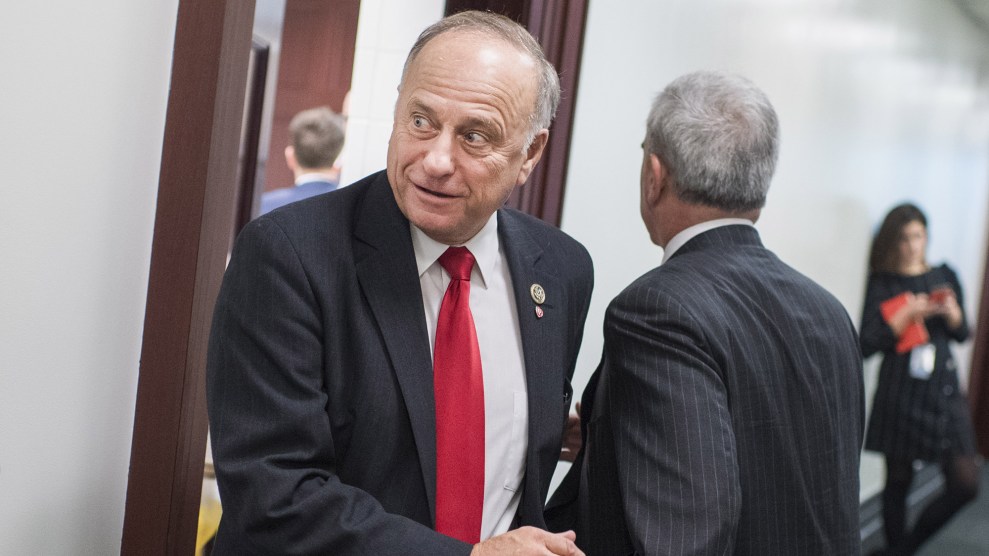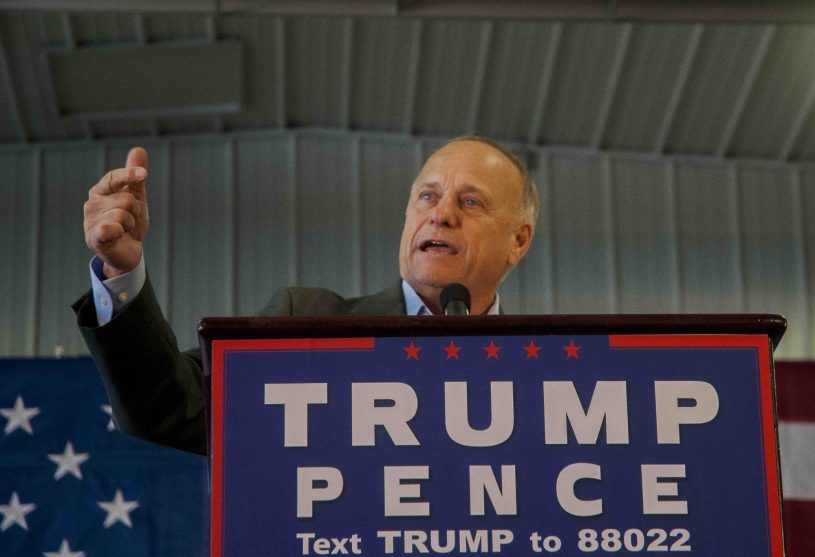
On a Sunday evening in mid-November, J.D. Scholten stood in the Swaledale, Iowa, City Hall and spoke, as he often does, about sandwiches. Scholten, a Democratic candidate for Congress in the state’s once reliably red 4th Congressional District, was in the midst of a series of town halls he called the “Don’t Forget About Us” tour, often making several stops a day in communities with fewer than 1,000 residents. About three dozen people were packed into the building’s only room, a wood-paneled space with paintings along the wall and a sagging ceiling that the 6-foot-6 Scholten could almost scrape with his perfectly bald head. Swaledale (population 158) was the smallest town he went through that day, and like most places he’d visited, it no longer had a grocery store.
“If you go from Sioux City and take the next three towns east on Highway 20,” he said, sketching a picture of the district for the crowd, “three of those have lost their grocery store in the last five years, and two of them have gained Dollar Generals.” Heads began to nod. “If you want a BLT in Correctionville, Iowa,” he continued, “you either have to grow your own tomato or drive into Sioux City to get one.”
At three stops over five hours, Scholten returned to the same themes—the rise of Dollar General, the exodus of young people, the pork monopolies, the GoFundMes for cancer patients, the grain elevators that couldn’t stay open without immigrant workers. But there was one subject Scholten almost never brought up: Steve King, the nine-term white nationalist Republican incumbent he’s trying to unseat.
“We never do,” Scholten told me, expressing surprise at my surprise. “Not never—we rarely talk about Trump, rarely talk about King. We talk about what we’re for.” Besides, he added, “we don’t know if it’s gonna be King at this point.”
And that’s the catch. When Scholten ran his first campaign against King two years ago, he was the longest of long shots, and a bit of a curiosity—a former minor league baseball player driving around in an RV called Sioux City Sue, camping in Walmart parking lots, and trying to take down a longtime incumbent in a district President Donald Trump carried by 27 points. But Scholten, boosted by a prolific grassroots fundraising operation and a kind of populist agrarianism that had largely disappeared from his party, closed the gap. On Election Day 2018, he lost by just three points—one of the biggest swings of any district in America.

Congressional candidate J.D. Scholten would rather talk about farm policy than Trump.
Joshua Lott/The Washington Post/Getty
A lot has changed since then. King has become a pariah in Washington and in his own party. In January, House Republican leadership stripped him of his committee assignments after he defended white nationalism in a New York Times interview. He has been left to voice his frustrations with the political system in unhinged social media screeds. Many of his biggest corporate donors are moving on, and primary challengers are lining up. The 2020 election might be Democrats’ best shot at taking King down—unless Republicans get him first.
There’s no small irony in King’s demise: His career is sliding off the rails just as the noxious ideas that he’d devoted that career to advancing have finally reached the highest levels of power.
In 2012, I sat with a small group of reporters in a cramped room in a DC hotel for a panel called “The Failure of Multiculturalism.” The event, part of the annual Conservative Political Action Conference, had caused a stir because of the presence of several attendees described as white nationalists. An hour into the talk, in walked Steve King. He took a seat near Peter Brimelow, founder of VDare, an anti-immigration website named after the first English child born in North America. (Brimelow is currently suing the New York Times for labeling him a white nationalist.) “I’ve read your books!” King told Brimelow admiringly. Afterward, King shrugged off the exchange and told reporters he was only there to promote legislation. This wasn’t about racism; it was about making English the national language. Two very different things, you see.
For a decade and a half, this was the game that national Republicans let King play. Maybe he was a little odd, perhaps he was a little coarse, but he was odd and coarse within the contours the party deemed acceptable—he was just a regular guy who wanted to build a fence along the border and electrify it so that migrants (“with calves the size of cantaloupes,” he once said) would stay out. And the party had ample space for people like that. He co-chaired Ted Cruz’s presidential campaign, then became one of Trump’s biggest boosters.
All the while, his white supremacism was in plain sight. In 2016, King conducted a local news interview with a Confederate flag on his desk, wondered aloud if anyone had contributed more to civilization than white people, and tweeted that “cultural suicide by demographic transformation must end.” In 2017, he said that “somebody else’s babies”—code for nonwhite immigrants—threatened to overtake the American experiment.
Even as Scholten’s campaign gained traction in 2018, King kept on going. When he was asked what a “white nationalist” was, he expressed frustration that the label had become “a derogatory term today—I wouldn’t have thought so maybe a year or two or three ago.” He endorsed a neo-Nazi for mayor of Toronto. He called Mexicans “dirt,” then said he hadn’t, then barred the reporter who recorded him from an event. King drew a rebuke from the National Republican Congressional Committee, and some of his major agribusiness donors, like the meatpacking giant Smithfield Foods, jumped ship. Yet even after all that, the state’s three most powerful elected officials rallied to his defense. Sen. Joni Ernst and Gov. Kim Reynolds held a last-minute rally to shore up support for King, and Sen. Chuck Grassley filmed a short video endorsing King, declaring, “Iowa needs Steve King in Congress.”
Apparently, Iowa didn’t need King so much as it just needed King to beat Scholten. With that out of the way, the break finally came in January 2019, after a Times reporter asked King, once more, about white supremacy. “White nationalist, white supremacist, Western civilization—how did that language become offensive?” King said. “Why did I sit in classes teaching me about the merits of our history and our civilization?” In response, House Minority Leader Kevin McCarthy (R-Calif.) stripped King of his committee assignments, including his precious spots on the agriculture and judiciary committees. Several Republican colleagues suggested King should resign.
Randy Feenstra, a Republican state senator who had announced a primary challenge to King just a few days earlier, saw a window of opportunity. “Our current representative’s caustic nature has left us without a seat at the table,” he said, calling King’s comments “abhorrent.” King beat back primary opponents in the previous two cycles, but Feenstra is his most serious challenger by far. Feenstra now has the backing of Bob Vander Plaats, one of the state’s most influential conservative activists, and Bruce Rastetter, a multimillionaire ethanol magnate dubbed “the real Iowa kingmaker” by Politico.
But Feenstra had also been a supporter of King for years, long after King’s racism became undeniable. In fact, just a few days after entering the race, Feenstra confirmed on a conservative radio show that he’d once told King’s son and campaign manager, “I love your dad. I’d never run against him.”
As Scholten drove past fields of corn and soybeans on the road to a town hall in Marble Rock (population 291), he reflected on his newfound competition. “As far as I can tell, the only thing I see them running on is they can beat me but Steve King can’t,” he said.
After his 2018 loss, Scholten started a chapter of a national nonprofit focused on poverty and became a regional dignitary, ushering Democratic presidential candidates around the district and pressing them for specifics on farm policy, especially his desire to break up the big agricultural corporations. “I’ve worked on probably five or six of the rural policies of the presidential campaigns,” he says. “Part of the reason you see antitrust in a lot of the presidential stuff—even Biden has it—is because I was pushing from the very get-go.” He’s hosted a town hall with Cory Booker and shot hoops with Andrew Yang. They get a friendly introduction; Scholten gets an audience.
Perhaps anyone can beat Steve King this year. But actually maintaining control of a rural district like Iowa’s 4th requires a deeper policy recalibration. Scholten toes a cautious line on health care (“I’m for all of them,” he said of the Democratic candidates’ plans) but a robust one on climate change, with an ag-centric approach that he says will help farmers’ bottom lines by paying them to conserve land and pump carbon into the soil.
Trust-busting is the core of his economic message. “If you know a pork producer, ask them how they did in 2017,” he tells an audience of mostly seniors (and one Republican opposition researcher) at a library in Fredericksburg.“Smithfield…owns one in four hogs in Iowa and across this nation. The CEO of China Pork, who owns Smithfield, made $291 million in 2017. That’s more than Elon Musk. That’s more than the CEO of Apple. That’s crazy.” The agriculture industry is more consolidated today, he said, “than when Upton Sinclair wrote The Jungle.” Scholten might be the only candidate in America talking about the Packers and Stockyards Act of 1921.
When I asked voters at Scholten’s events how they felt about King, “embarrassment” was the most common response. Several brought up his loss of committee assignments. “It’s like having someone represent you that can’t do anything,” said Frank Rottinghaus, the Democratic Floyd County treasurer, as he waited to hear Scholten speak in Marble Rock.
But King isn’t going down quietly. With virtually no campaign cash but plenty of free time, he held town halls in his district’s 39 counties last year. Officially, he was updating constituents on what he was doing in Washington, but since he can’t really do anything in Washington, he devoted much of his time to clearing his name and trashing his rivals. At one stop, King read aloud from 1984. He tried to salvage his disastrous Times interview, claiming variously that the paper distorted his words and that the hearing-assistance device he plugs into his iPhone was not properly set up. On the House floor, he alleged he was the victim of a conspiracy led by the financier George Soros—the same man he held responsible for Trump’s impeachment.
In December, as the House moved toward impeaching the president, the Judiciary Committee was the hottest seat for members of Congress seeking to boost their national profiles. But one voice was missing: King’s. As his colleagues took their turns preening for national TV cameras, the man who paved the way for Trumpism, long before Trump launched his campaign, was reduced to recording a video of his thoughts for Facebook, a hunting cap hanging from the coatrack beside him.
“You’re live,” a staffer told him. For now, at least.














